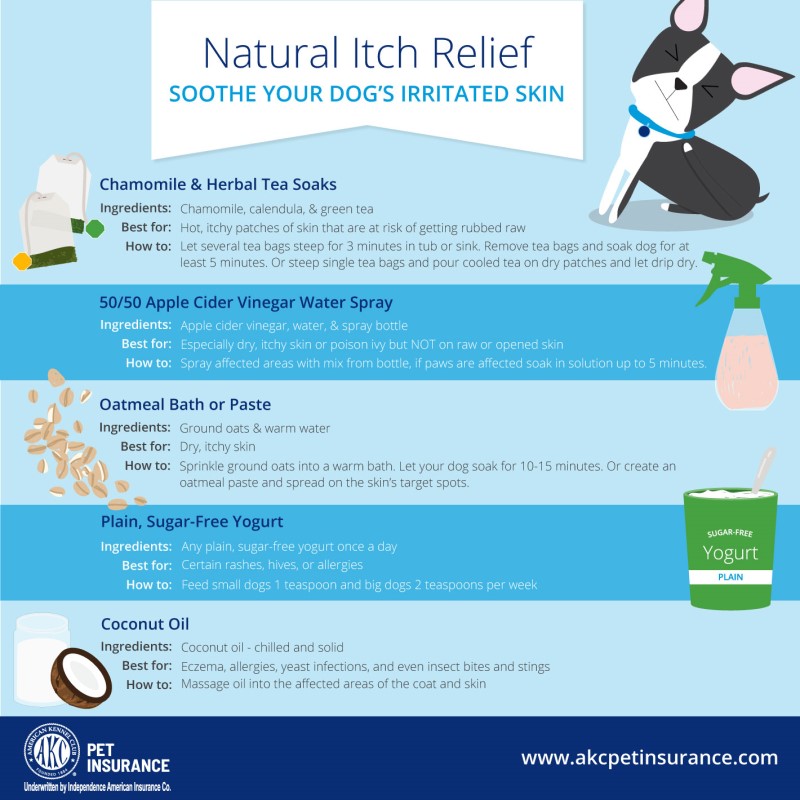You know the sounds--they’ve kept you up at night. The scratching, the licking, the chewing. Your dog is itching like crazy and it’s driving you both up the walls! Chronic or severe itching and scratching in dogs can have many causes. Whether you've been asking yourself, "Why is my dog so itchy?" for a few days or for a few weeks, it's time to get some answers. That's why we created this list of natural remedies for itchy dogs!
Before you check out the list, keep in mind that some dogs may require a checkup by a licensed veterinarian for severe itching issues. If the itching your dog is experiencing has been ongoing or if your dog is developing self-inflicted wounds due to itching, it's time to visit the vet!

Chamomile and Herbal Tea Soaks
- Chamomile, calendula, and green tea have properties that soothe and cool irritated skin and reduce inflammation, making them great additions in a dog bath for itchy skin. These soaks are best for dogs who have hot, itchy patches of skin that are at risk of getting rubbed raw.
- If your dog is inconsolably itchy all over, fill up your tub or sink with warm water and let several herbal tea bags steep for three minutes. Remove the tea bags and let your dog soak in the bath for at least five minutes.
- Alternatively, for smaller, itchy patches, steep one or two tea bags in about two cups of hot water. Once the tea has cooled down, pour it on your dog’s skin as a quick fix, letting it drip dry without rinsing.
Apple Cider Vinegar for Itchy Dogs
- Apple cider vinegar is a natural, safe soother for especially dry, itchy skin. The antiseptic and antifungal nature of apple cider vinegar makes it a great form of relief from poison ivy but NOT on raw or opened skin. If your dog has itched their skin raw, this solution will sting the exposed wound.
- To avoid getting vinegar in any open cuts, fill a spray bottle with 50% water and 50% apple cider vinegar to target affected areas. If your dog walked through a patch of poison ivy, oak, or sumac, soak their paws in the solution for up to five minutes.
Oatmeal Bath for Itchy Dogs
- Oatmeal is an age-old remedy for our dry, itchy skin that happens to be safe for use on our canine friends too! In fact, most doggy hypoallergenic shampoos include oatmeal as an active ingredient to soothe and fight irritation.
- Start by grinding plain oatmeal into a powder to sprinkle in your dog’s warm bath. The oatmeal will typically take 10 to 15 minutes to cool down red, angry skin, no matter the cause. It is also nontoxic, so it’s okay if your pet licks some off during their long bath. If this sounds like a long time for your pup to be in the tub without a struggle, try some of our techniques to Curb Bath Time Fears.
- Another option to avoid a full-on bath is to make an oatmeal paste. Take your ground oatmeal and gradually add a little bit of water until you are left with a paste that has a spreadable consistency. Target spots that have been bothering your dog and make sure the paste is in contact with the skin on longer-haired dogs for maximum relief.
Sugar-Free Plain Yogurt
- Feeding your itchy dog plain, unsweetened yogurt may offer many health benefits. Some yeast infections and skin irritation can stem from your dog’s digestive system. This remedy is good for dogs who have certain types of rashes, hives, or allergies. Before you feed yogurt to your dog, be sure to check with your vet about the potential risks.
- Feeding small dogs one teaspoon of yogurt and big dogs two teaspoons once a week will improve their overall gut health. Most dogs like the taste of yogurt on its own, but it can also be mixed with food to help digestion.
Coconut Oil for Itchy Dogs
If you have been asking yourself, "What can I give my dog for itchy skin if nothing else is working?" then coconut oil may just be the perfect remedy for your pup. Its high viscosity immediately soothes, while its other components help to calm the skin right away.
- The best oils for dogs are those that offer the kind of viscous protection needed to create a natural barrier between angry skin and the environment. For this reason, coconut oil is among the best oils for canine skin, which is why so many products for pups use it as a key ingredient.
- Many natural beauty products now contain coconut oil because of its antibacterial and antifungal properties. It is also an excellent moisturizer for canines, as the oils can penetrate fur for direct contact with the skin. Dogs who are suffering from eczema, allergies, yeast infections, and even insect bites and stings can all benefit from direct application of coconut oil.
- Put coconut oil in the fridge or a cool, dry place so it turns completely solid. For quick relief to dry skin, massage the oil into the coat and on the skin of your dog. Over time, you'll notice your dog’s coat improving, along with relief from constant itching!
Why Is My Puppy So Itchy?
If the dog experiencing severe itchiness is still a puppy and you have already ruled out any potential causes like diet and environment, you should visit a licensed veterinary dermatologist as soon as possible.
A veterinary dermatologist can run tests that general practitioners do not have the ability or equipment to handle in-house. Additionally, you have a better chance of getting to the bottom of your dog's itchiness faster with a specialist who can quickly recognize the root of the problem, whether it be food allergies, air quality, other environmental causes, or even psychological or behavioral issues.
The itchy dog home remedies noted above are safe for most dogs and skin issues. However, you should always consult your veterinarian before using any of these treatments on your pet. A proper diagnosis is key to providing the most effective treatment for your dog’s itchy skin.
Take some of the stress out of unexpected skin conditions with Accident & Illness Coverage from AKC Pet Insurance (underwritten by Independence American Insurance Company). Our dog pet insurance plans are designed to be there when you need them, allowing you to focus more on the health of your pet and less on costly veterinary bills. Click here for a quote today!
The information provided in this blog is intended for educational purposes only and should not serve as a substitute for the professional medical advice of a licensed veterinarian. Always consult your vet with any questions about your pet’s health before initiating any treatment regimes.


